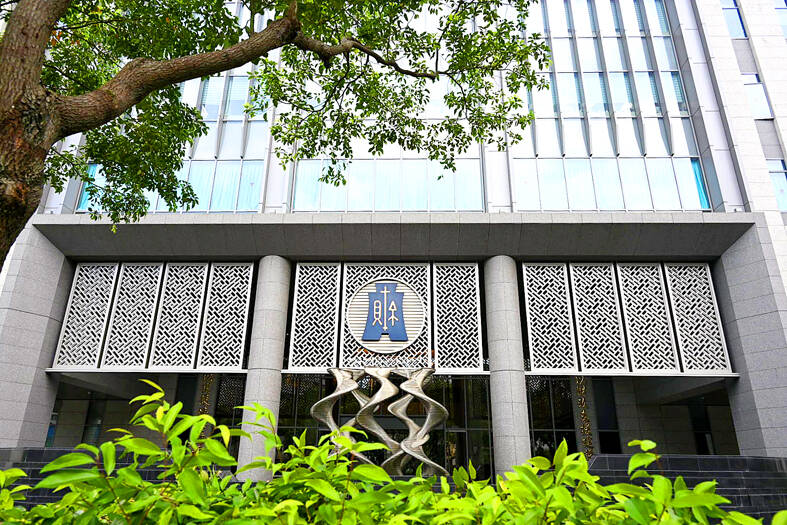Starting next year, Taiwan would adjust income tax rates for multinational enterprises (MNEs) to align with the Organisation for Economic Co-operation and Development’s (OECD) global minimum tax framework, the Ministry of Finance said in a statement on Wednesday.
MNEs with operations in Taiwan would be taxed at 15 percent, up from the current 12 percent, the ministry said.
The taxes would take effect when the businesses file their taxes in 2026, it said.

Photo: Chang Chia-ming, Taipei Times
Small and medium-sized enterprises as well as large businesses with an effective tax rate of 15 percent would not be affected, it added.
According to the OECD, the new tax rules apply to any MNEs with consolidated annual revenues of more than 750 million euros (US$831 million) for any two fiscal years within the past four years. These companies would be subject to a 15 percent effective minimum tax rate wherever they operate.
This measure aims to reduce the incentive to shift profits to low-tax countries, while also conforming with the ability-to-pay principle, the ministry said.
Currently, 60 countries or regions around the globe have announced they would adopt the global minimum tax. These include Taiwan’s neighbors Japan, South Korea, Singapore and Hong Kong, as well as some of Taiwan’s main trade partners, such as EU countries and Canada, the ministry said.

Nvidia Corp’s demand for advanced packaging from Taiwan Semiconductor Manufacturing Co (TSMC, 台積電) remains strong though the kind of technology it needs is changing, Nvidia CEO Jensen Huang (黃仁勳) said yesterday, after he was asked whether the company was cutting orders. Nvidia’s most advanced artificial intelligence (AI) chip, Blackwell, consists of multiple chips glued together using a complex chip-on-wafer-on-substrate (CoWoS) advanced packaging technology offered by TSMC, Nvidia’s main contract chipmaker. “As we move into Blackwell, we will use largely CoWoS-L. Of course, we’re still manufacturing Hopper, and Hopper will use CowoS-S. We will also transition the CoWoS-S capacity to CoWos-L,” Huang said

Nvidia Corp CEO Jensen Huang (黃仁勳) is expected to miss the inauguration of US president-elect Donald Trump on Monday, bucking a trend among high-profile US technology leaders. Huang is visiting East Asia this week, as he typically does around the time of the Lunar New Year, a person familiar with the situation said. He has never previously attended a US presidential inauguration, said the person, who asked not to be identified, because the plans have not been announced. That makes Nvidia an exception among the most valuable technology companies, most of which are sending cofounders or CEOs to the event. That includes

INDUSTRY LEADER: TSMC aims to continue outperforming the industry’s growth and makes 2025 another strong growth year, chairman and CEO C.C. Wei says Taiwan Semiconductor Manufacturing Co (TSMC, 台積電), a major chip supplier to Nvidia Corp and Apple Inc, yesterday said it aims to grow revenue by about 25 percent this year, driven by robust demand for artificial intelligence (AI) chips. That means TSMC would continue to outpace the foundry industry’s 10 percent annual growth this year based on the chipmaker’s estimate. The chipmaker expects revenue from AI-related chips to double this year, extending a three-fold increase last year. The growth would quicken over the next five years at a compound annual growth rate of 45 percent, fueled by strong demand for the high-performance computing

TARIFF TRADE-OFF: Machinery exports to China dropped after Beijing ended its tariff reductions in June, while potential new tariffs fueled ‘front-loaded’ orders to the US The nation’s machinery exports to the US amounted to US$7.19 billion last year, surpassing the US$6.86 billion to China to become the largest export destination for the local machinery industry, the Taiwan Association of Machinery Industry (TAMI, 台灣機械公會) said in a report on Jan. 10. It came as some manufacturers brought forward or “front-loaded” US-bound shipments as required by customers ahead of potential tariffs imposed by the new US administration, the association said. During his campaign, US president-elect Donald Trump threatened tariffs of as high as 60 percent on Chinese goods and 10 percent to 20 percent on imports from other countries.